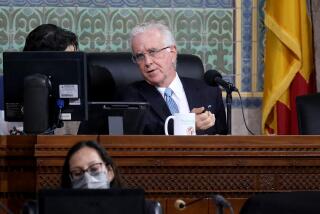City Council Argues Over Ways to Cut Infighting
- Share via
THOUSAND OAKS — Mayor Andy Fox believed his campaign to reduce the gabbing, bickering and grandstanding that frequently plague the City Council would be one tough challenge.
He was right.
A special workshop Thursday to discuss ways to reduce infighting and make council meetings more manageable turned into a drawn-out debate over the rights of individual council members to explain their positions.
“The council meeting is not a soapbox for individual council members,” Fox said at one point in the meeting.
“Andy, I’m offended,” Councilwoman Elois Zeanah replied indignantly.
As debate wore on, with several voices speaking at once, Fox put his finger to his lips and said “Sssh.”
The new mayor came to the meeting with several proposals, such as reducing the number of items the council should discuss each meeting, and imposing time limits on comments by council members.
Many of his ideas drew criticism from Zeanah and Councilwoman Jaime Zukowski, who are often on the losing end of the council’s 3-2 votes. Zeanah, in particular, resisted Fox’s suggestion that council members should no longer be allowed to put items on the agenda and expect a vote that night without a staff review.
“That’s the wrong attitude,” Zeanah said. “That’s saying the minority doesn’t matter. That’s the tyranny of the majority.”
Both Zeanah and Zukowski said they believed staff members are biased against their proposals.
That led to another point in the debate: whether to allow council members to criticize the city’s staff members in public. Fox argued that such criticism was unfair and should be banned.
“Staff has come to me feeling bad when there are exchanges between staff and council,” Fox said. “What do you want me to do . . . do we want to hold up yellow [penalty] cards like in soccer?”
Zeanah retorted, “I don’t personally attack staff in public.”
“Elois, in my opinion, you do,” Fox shot back.
This was exactly what Fox had hoped to eliminate with the guidelines the council was establishing Tuesday night.
“My hope is that we can put some mechanisms in place to operate more efficiently,” Fox said before the workshop. “These meetings are going on for way longer than they should.”
When Fox began his one-year term as mayor last month, he pledged to ease what he saw as superfluous arguments and discussions, trying to shorten night meetings that frequently ran five hours and often longer.
As he put it, he would wield the mayor’s gavel with authority, restoring order to meetings that had gotten out of hand. So far, Fox has been moderately successful, but much time-consuming quibbling continues.
“We’re there to run a professional meeting,” said Councilman Mike Markey. “Since Andy took over, [meetings] have gotten much better. There seems to be an effort to reduce that stuff. But you can’t limit grandstanding all the time. Some people just like to talk.”
*
The speeches usually stem from the different political philosophies of the council’s two factions: the slow-growth voices of Zeanah and Zukowski and the pro-business leanings of council members Judy Lazar, Markey and Fox.
Fox believes that debate should end shortly after a majority of council members have come to agreement on an issue, because the vote has likely been decided. But not everyone agrees.
Lazar--who is admittedly prone to some long-winded remarks herself--said she supports the idea of limiting comments by council members.
“I think we need a timer,” she said before the meeting. “As one of those people who talks a lot sometimes, I need something to remind me how long I’ve talked for.”
But Lazar said that many council discussions are necessarily long, and she is concerned that some issues might receive short shrift as a result of arbitrary time constraints.
“The people need to know where the council is coming from, and those issues take a lot of discussion,” she said. “I would hate for the public to not understand why we did something because we were moving so fast.”
*
The City Council has already made several efforts to shorten its sessions, such as limiting public comments to the first hour of every meeting.
But Markey said the biggest offenders are not the public, but council members. He believes the council needs to make more of a contribution.
“We are the biggest violators of [talking too much] ourselves,” Markey said. “We get 25 to 30 minutes off-track on these discussions all the time.”
One thing that may make limiting debate more difficult is the council’s decision on Tuesday to eliminate council committees in 1996.
Because of that decision, which was made to reduce bureaucracy, the council will have to discuss some issues in depth this year that had previously been mulled over by committees, that then distilled issues for the council.
So, would council members actually adhere to a new standard of conduct? Maybe not, Lazar said. But at least the effort would remind council members that they should attend meetings to decide issues together, not to fight.
“Whether it will change some people, I don’t know,” she said. “Frankly, I have my doubts. But it’s worth a try.”
More to Read
Sign up for Essential California
The most important California stories and recommendations in your inbox every morning.
You may occasionally receive promotional content from the Los Angeles Times.










